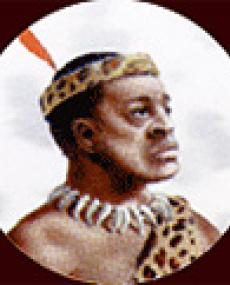
Mpande was king of the Zulu nation from 1840 to 1872, making him the longest reigning Zulu king. He was a half-brother of Shaka and Dingane, who both preceded him as kings of the Zulu. He was born in Babanango, Zululand.
Mpande was viewed as a weak man in comparison to his contemporaries. Dingane (his half brother and predecessor) actually instructed his chief induna Ndlela kaSompisi to assassinate Mpande, Ndlela repeatedly delayed, because Mpande was the only son to have had any children, and Ndlela considered the continuation of the blood line crucial to the stability of the Zulu nation. Ndlela was tortured to death by Dingane for his inaction.
After Mpande learned in 1838 that Dingane did not trust his loyalty and planned to kill him, Mpande fled Zululand, taking his followers across the Thukela (Tugela) River.
When Dingane killed one of the Voortrekker leaders, Piet Retief, the Voortrekkers sought revenge. In the Battle of Blood River on 16 December 1838, 470 Voortrekkers, led by Andries Pretorius, defeated an estimated 10,000 Zulu attackers on the banks of the Ncome River at in what is today KwaZulu-Natal, South Africa. Casualties amounted to 3,000 Zulu deaths and 3 wounded Voortrekkers.
Mpande knew that Dingane’s kingdom was weakened and he asked the Voortrekkers to give him military support as he moved back into Zululand to fight Dingane. Mpande was more amenable to the demands of the Voortrekkers so they agreed to help him. In January 1840 Andries Pretorius with a commando of 400 burghers helped Mpande in his revolt against his half-brother Dingane, who was killed on an expedition north in the Hlatikhulu Forest. Mpande was installed by Pretorius as King of the Zulu, and the southern part of Mpande’s territory was annexed by the Natal Republic.
At the time of Mpande’s succession, his son Cetshwayo was declared his heir. The rule of succession is that the heir is born of the women whom the King makes his chief wife. Cetshwayo was declared heir because he was born of a wife given to him by Dingane. But later, Mpande began to favour Mbuyazi, son of his most beloved wife and Cetshwayo and Mbuyazi became rivals.
Meanwhile Mpande was faced with both British and Afrikaner settlers on his borders, and he tried not to alienate either party. In 1854 Mpande granted Boer settlers in Northern KwaZulu Natal a deed of cession for an area on the border between Zululand and the Transvaal Republic. This area was to become the Republic of Utrecht.
By 1856 Cetshwayo was steadily gaining influence and importance but he was still threatened by his brother Mbuyazi. In the ensuing battle of Ndondakusuka Mpande backed Mbuyazi, who was also supported by John Dunn. But Cetshwayo dramatically defeated his brother on the banks of the Tugela River in 1857. Mpande tried to prevent Cetshwayo from threatening his power, and he again appealed to both the British and the Afrikaners for support. The British official Theophilus Shepstone encouraged Cetshwayo to proclaim his loyalty to his father, and in 1865 Mpande and Cetshwayo were reconciled, but and for the next 15 years Cetshwayo seemed to control the Zulu nation.
In 1860 a commission was appointed to mark the border of the new Republic of Utrecht (land that Mpande ceded in 1854) and the Boers wanted to get land from the Zulu for a road from Utrecht to St. Lucia Bay on the north coast. The commission was unsuccessful and the area became a disputed territory, the issue particularly angered Cetshwayo.
Mpande had a third son, Umtonga (older than Cetshwayo). Cetshwayo also began to see him as a threat and chased him into Utrecht in 1861. Cetshwayo’s army camped on the border of the Boer Republic and promised the Boers a strip of land on the border if they handed his brother over. The Boers were prepared to meet his request if he spared Umtonga’s life and Mpande signed a deed giving the Boers the additional land. The extra territory extended from Rorke’s Drift on the Buffalo River to a point on the Pongola River. Utrecht expanded and this new border was officially marked in 1864.
Umtonga fled from Zululand to the Colony of Natal in 1865 and Cetshwayo felt that part of the agreement he made with the Boers had not been upheld. He reclaimed the land his Mpande had given to the Boers in 1861. This move nearly caused a war as a Zulu army under Cetshwayo and a Boer commando under Paul Kruger positioned themselves along the border between Utrecht and Zululand. In 1869 the Lieutenant Governor of the Colony of Natal, Sir Anthony Musgrave, was called in to solve the argument between the two groups, but he failed to do so.
Although it is clear that by this stage Cetshwayo’s influence was greater than that of Mpande’s, he remained king until his death on 19 November 1872, although he withdrew increasingly from public life. He died in his Kraal, Nodwengu in Zululand. After his death Cetshwayo came to the throne and an official coronation ceremony took place the following year.
*Note: some sources give this date as the 18 October 1872